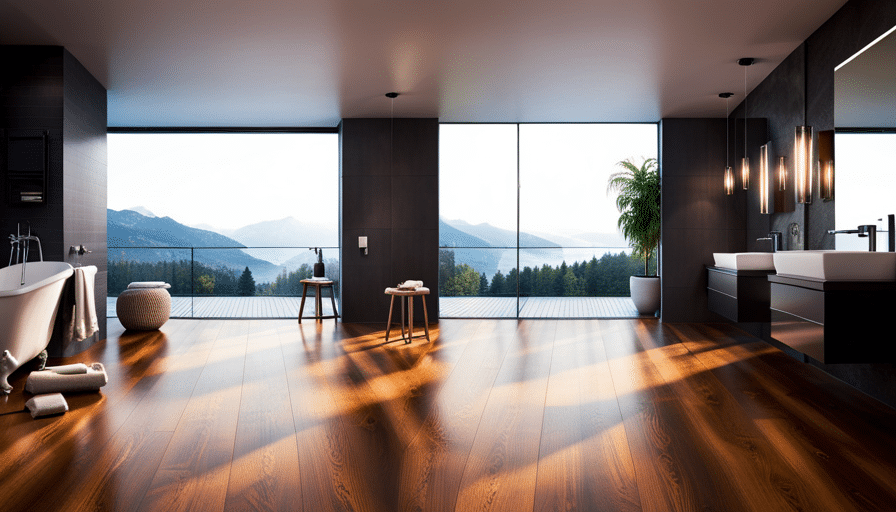Waterproof laminate flooring is a popular choice for homeowners seeking a durable and versatile flooring option. This type of flooring combines the aesthetic appeal of laminate with the added benefit of being resistant to water damage.
Laminate flooring is composed of multiple layers, typically including a core layer, a decorative layer, and a wear layer. The core layer is made from high-density fiberboard or particleboard, which provides stability and strength. The decorative layer is a high-resolution image that mimics the appearance of natural materials like wood or stone. The wear layer, usually made of aluminum oxide, protects the flooring from scratches and wear.
To make laminate flooring waterproof, manufacturers add a special layer to the core layer that repels water and prevents moisture from seeping into the floor. This layer is often made of a resin or melamine material that creates a barrier against water damage.
Waterproof laminate flooring is suitable for various areas in the home, including kitchens, bathrooms, and basements, where moisture and spills are common. It offers the look of hardwood or tile without the risk of warping or damage due to water exposure.
In conclusion, waterproof laminate flooring provides a practical and aesthetically pleasing flooring solution for homeowners who desire both durability and water resistance.
Key Takeaways
- Waterproof laminate flooring combines the aesthetic appeal of laminate with resistance to water damage.
- It is composed of multiple layers, including a core layer, a decorative layer, and a wear layer.
- The special waterproof layer added to the core layer repels water and prevents moisture from seeping into the floor.
- Waterproof laminate flooring is suitable for areas prone to moisture, such as bathrooms and kitchens, and offers advantages over hardwood flooring in terms of durability and maintenance.
Understanding Laminate Flooring
Laminate flooring is a popular choice for homeowners due to its affordability, durability, and versatility in replicating the appearance of natural materials such as hardwood or stone.
When it comes to laminate flooring installation, it is relatively easy and can be done by homeowners themselves. The installation process typically involves interlocking the planks or tiles together, eliminating the need for adhesives. However, it is crucial to ensure a smooth and level subfloor to prevent any issues with the installation.
Common laminate flooring issues include water damage, swelling, and warping. While laminate flooring is not inherently waterproof, advancements in technology have led to the development of waterproof laminate flooring. This type of flooring is designed to resist moisture and can be a suitable option for areas prone to spills or high humidity levels.
The Benefits of Water-Resistant Flooring
Water-resistant flooring provides numerous advantages, such as enhanced durability and protection against moisture-related damage. One of the main benefits of water-resistant laminate flooring is its low maintenance requirements. Unlike traditional laminate flooring, which can be damaged by water spills, water-resistant laminate is designed to resist moisture penetration. This means that spills can be easily wiped up without causing any damage to the flooring.
Additionally, water-resistant laminate is less prone to warping or swelling when exposed to humid environments, making it an ideal choice for areas such as bathrooms or kitchens. Furthermore, this type of flooring is resistant to stains, making it easier to clean and maintain its appearance over time.
Overall, the advantages of water-resistant laminate flooring make it a practical and durable option for homeowners seeking a flooring solution that can withstand moisture-related challenges.
How Waterproof Laminate Flooring is Made
Manufacturing processes for this type of moisture-resistant flooring involve the combination of various materials that are carefully engineered to create a protective barrier against water damage.
The manufacturing process of waterproof laminate flooring incorporates advanced waterproofing technology to ensure its resistance to moisture.
A key component of this technology is the use of a high-density fiberboard core, which is treated with a specially formulated resin that prevents water absorption.
Additionally, the top layer of the laminate is infused with a water-resistant coating that further enhances its ability to repel liquids.
The combination of these materials and technologies creates a flooring product that is highly resistant to water damage, making it suitable for areas prone to moisture, such as bathrooms and kitchens.
The manufacturing process ensures that the waterproof laminate flooring maintains its durability, stability, and aesthetic appeal even when exposed to water or high humidity levels.
Where to Use Waterproof Laminate Flooring in Your Home
One ideal application for this moisture-resistant flooring is in areas of the home that are frequently exposed to high levels of humidity or moisture, such as bathrooms and kitchens.
In addition to these indoor spaces, waterproof laminate flooring can also be used for outdoor applications. Its durability and lifespan make it suitable for areas like patios, balconies, and even pool decks. The construction of waterproof laminate flooring allows it to withstand the harsh outdoor elements, such as rain, UV rays, and temperature fluctuations.
The top layer of the flooring is specially designed to resist moisture, preventing any damage or warping. With its ability to withstand both indoor and outdoor conditions, waterproof laminate flooring provides a versatile and long-lasting solution for homeowners.
Maintaining and Cleaning Waterproof Laminate Flooring
To properly care for and preserve the appearance of waterproof laminate flooring, regular maintenance and cleaning are essential.
Maintaining laminate durability involves a few key steps. First, it is important to sweep or vacuum the floor regularly to remove dirt and debris, as these can scratch and dull the surface over time.
Additionally, it is recommended to use a damp mop with a mild cleaning solution specifically designed for laminate flooring. Avoid using excessive water, as this can seep into the joints and cause damage.
When dealing with spills, it is crucial to clean them up immediately to prevent any moisture from penetrating the laminate.
Overall, by practicing regular maintenance and cleaning, homeowners can ensure the longevity and beauty of their waterproof laminate flooring.
Comparing Waterproof Laminate to Other Flooring Options
When considering different options for your home’s flooring, it is important to analyze the qualities and features of waterproof laminate in comparison to other available materials.
Waterproof laminate flooring offers several advantages over hardwood flooring. Firstly, it is resistant to moisture and can withstand spills and humidity without warping or buckling. This makes it an ideal choice for kitchens, bathrooms, and other areas prone to moisture.
Additionally, waterproof laminate is more durable than hardwood, as it is less prone to scratches and dents. It is also easier to clean and maintain, as it does not require refinishing or polishing like hardwood.
Overall, waterproof laminate provides a cost-effective and long-lasting flooring solution that can mimic the appearance of hardwood while offering superior durability and resistance to moisture.
Frequently Asked Questions
Can waterproof laminate flooring be installed in bathrooms?
Yes, waterproof laminate flooring can be installed in bathrooms. It is designed to withstand moisture and humidity, making it a suitable choice for this area. Additionally, its maintenance is easy and it offers the benefits of durability and affordability.
Can waterproof laminate flooring be used in basements?
Advantages of waterproof laminate flooring in basements include resistance to moisture, durability, and easy maintenance. To choose the right flooring, consider the thickness, AC rating, underlayment, and installation method suitable for basement conditions.
Is waterproof laminate flooring suitable for commercial use?
Waterproof laminate flooring is suitable for commercial applications due to its durability and resistance to moisture. It requires minimal maintenance, making it a cost-effective option for high-traffic areas. Regular cleaning and proper installation are necessary for optimal performance.
Can waterproof laminate flooring be installed over radiant heating systems?
Waterproof laminate flooring can be installed over radiant heating systems. It offers several benefits, including durability, moisture resistance, and ease of cleaning. Additionally, it is suitable for installation on concrete and ideal for use in kitchens.
Are there any specific precautions to take when installing waterproof laminate flooring in high-moisture areas?
Precautions during installation of waterproof laminate flooring in high-moisture areas include ensuring proper subfloor preparation, using a moisture barrier, and allowing for expansion gaps. Maintenance tips include regular cleaning with a damp mop and avoiding excessive water or steam.
Conclusion
Waterproof laminate flooring is a type of flooring that is designed to resist water damage. It is made by adding a waterproof layer to the top of the laminate, which helps to prevent water from seeping into the core of the flooring.
This makes it a great choice for areas of the home that are prone to moisture, such as kitchens and bathrooms. In addition to being water-resistant, laminate flooring is also durable, easy to install, and available in a wide range of styles and colors.
Overall, waterproof laminate flooring offers a practical and stylish solution for homeowners who want a flooring option that can withstand water and moisture.


